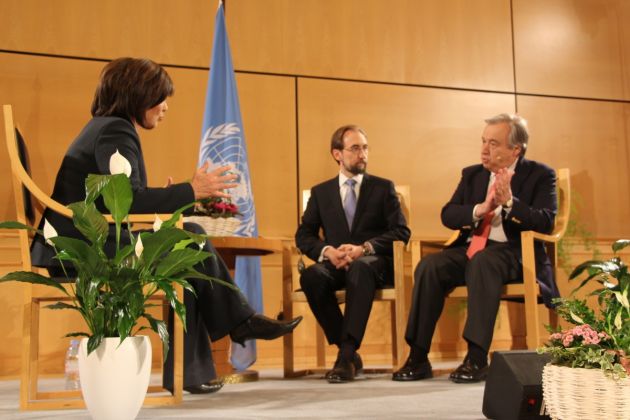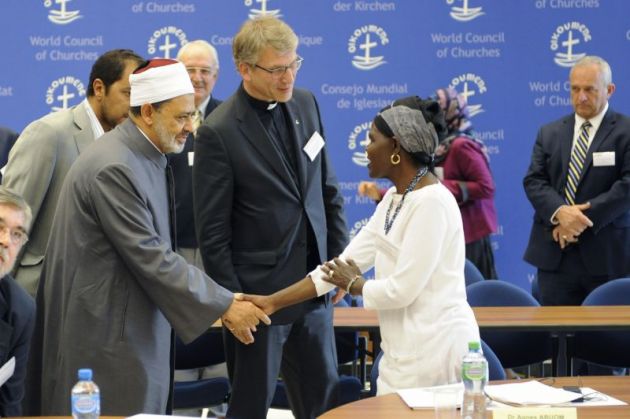Do more to fight anti-Semitism in the United States, UN rights' chief urges Trump

GENEVA - The United Nations High Commissioner for Human Rights Zeid Ra'ad al-Hussein has said that U.S. President Donald Trump needs to do more to combat anti-Semitism and racism in the United States.
"Greater and more consistent leadership is needed to address the recent surge in discrimination, anti-Semitism, and violence against ethnic and religious minorities" in the US, he said at a meeting of the Human Rights Council in Geneva on March 8.
Zeid made his comments the day after a number of Jewish community centers and Jewish institutions received threats in the sixth such inccident this year.
The day before countries around the world were urged to act now to promote and protect the right to freedom of religion or belief, by a United Nations expert.
The appeal by the U.N. Special Rapporteur, Ahmed Shaheed, was made at the Human Rights Council in Geneva, on March 7 where the expert was setting out his priorities for the mandate of "freedom of religion and belief" which he took up last November.
Shaheed expressed concern about a rise in the number of incidents of incitement to hatred, hostility, discrimination or violence based on religion or belief as well as, hate crimes by extremist groups, vigilante mobs and others.
"State and non-State actors, alike, continue to impose restrictions (or limitations) and engage in targeted harassment, intimidation of, or discrimination against religious minorities, unrecognized religious communities and dissidents, who are often confronted with threats to their freedom, safety and security," Shaheed said.
"I am particularly alarmed by continuing reports of mass atrocities and violence that threaten the very existence of religious minority communities, including some groups that have existed for over two millennia."
On the same day World Council of Churches general secretary, Rev. Olav Fykse Tveit, joined other speakers at a side event of the 34th session of the U.N. Human Rights Council.
METROPLITAN HILARION
The speakers included Metropolitan Hilarion, head of external church relations for the Russian Orthodox Church and they addressed the topic of "Mutual Respect and Peaceful Coexistence as a Condition of Interreligious Peace and Stability: Supporting Christians and Other Communities."
Tveit noted that, in respecting one another's identities and faith, people are also called to respect others' basic needs. In many parts of the world, where Christians and others are suffering from persecution and violence, this is not the case.
"This is a reality that we all have to deal with in a responsible manner," he said, and meeting together to share ideas and mutual respect is one important approach. At the event, speakers represented many faith groups from across the world.
Tveit said. It will take international support and collaboration to bring a sense of security to different faith groups in countries such as Iraq and Syria.
Prior to his appointment as a U.N. envoy Shaheed was a politician in Maldives and a human rights defender. He served as Maldivian Minister of Foreign Affairs from November 2008 to December 2010 and between July 2005 and August 2007.
Shaheed is also the chairperson of the human rights think-tank, Universal Rights Group and has been recipient of the Leo Nevas Human Rights Award and the Study of Islam and Democracy's Muslim Democrat of the Year Award.
During his speech, Shaheed pointed to a number of mechanisms for the promotion and protection of the right to freedom of religion or belief that have already been developed and for which consensus among states already exists.
He said his agenda for the next three years would be focused on the implementation of state obligations to promote respect for freedom of religion or belief and for which he would seek support from member states and civil society in the coming months.
The Rapporteur's agenda also endeavours to promote literacy about what the right to freedom of religion or belief means.
He said: "increased moves by some States to impose security clampdowns as a means of responding to violence in the name of religion further compounds the corrosive conditions that already undermine the right to freedom of religion or belief."
Shaheed stressed that policies adopted to enhance the capacity of security forces to combat terrorism by limiting fundamental rights, such as freedom of expression, association and peaceful assembly, often have dire consequences for the enjoyment of the right to freedom of religion or belief.
FREEDOM OF RELIGION AND BELIEF
He welcomed efforts being made to promote the right to freedom of religion or belief at national and international levels by governments, parliamentarians, national human rights institutions, human rights and faith-based organizations as well as educational institutions.
"These entities," he said, "have raised international awareness about the challenges to the realization of freedom of religion or belief, encouraged positive State actions, fostered interfaith dialogue, and created networks of government and civil society around the issue.
"These efforts can be harnessed to support even more effective implementation of the right to freedom of religion or belief.
"Civil society plays a useful and critical role in building bridges and trust between and among diverse stakeholders, especially given the polarized nature of debates surrounding the right to freedom of religion or belief. It is important that we continue to support cross-boundary and interdisciplinary efforts to help promote efforts to realize this right," he said.
The Special Rapporteur said he looks forward to working with a range of government, civil society actors and religious or belief community leaders to foster new relationships and to strengthen existing ones with the aim of achieving a more widespread implementation of laws allowing the right to freedom of religion or belief.
